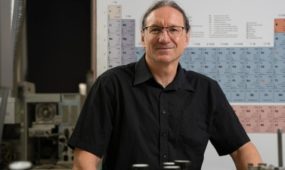Powering a commercial fleet with home-made biodiesel
Education
AN ORGANIC garden and farm products manufacturer is taking its green message a step further by creating its own biodiesel to run its fleet of trucks

Sign up to receive notifications about new stories in this category.
Thank you for subscribing to story notifications.
.
Peats Soil, which makes potting mixes, soils and mulches in South Australia, is creating biodiesel from the ‘dirty water’ gathered from food manufacturing locations.
The eco biodiesel will fuel a fleet of 14 new Scania trucks that will be used for Peats’ collection and delivery operations throughout South Australia.
Managing Director Peter Wadewitz said that the project involves collecting residual water and then extracting the fats from that water. Enzymes are then added to break down the fats, followed by 20 percent ethanol to assist in the completion of the process.
“We plan to produce a million litres of bio fuel in a year,” says Wadewitz. “With additional investment we can make it a continuous project.”
Peats Soil has always been ahead of the game in manufacturing products from recycled organic materials.
“We want to feed the soil using micro-biology,” says Wadewitz. “People often put chemicals into the soil and don’t think about the consequences. It’s important to build up the health and strength of the soil to ensure sustainability.”
Wadewitz says that the production of 1 million litres of bio-fuel should stop approximately 3000 tonnes of carbon dioxide from entering the atmosphere each year.
The first stage of the project is expected to cost $700 000, and will increase to $1 million in the later stages but Wadewitz expects the recoup the investment through reduced energy costs.
“It is very important to be commercially sustainable,” Wadewitz said. “There’s no point in being environmentally sustainable if you’re going to go broke.”
The biodiesel production facility was established in partnership with the University of Adelaide.
The university approached Wadewitz with the idea and provided laboratories to research and develop the manufacturing concept.
This first stage of research and development was funded from the Australian Research Council but Wadewitz says that he is paying to produce the bio fuel at the Peats Soil’s Operations Depot at Brinkley, South Australia.
Wadewitz said the company will soon build large anaerobic digestion pods to extract methane from food scraps to feed a turbine to create up to 30,000 tonnes of ‘green organic’ power.
Wadewitz said the company plans to expand their renewable energy projects in to India and China.
Jump to next article



